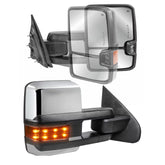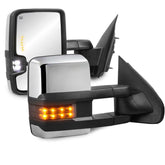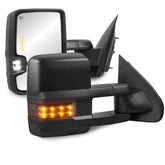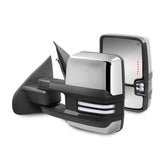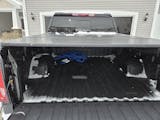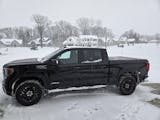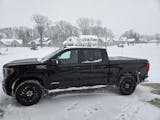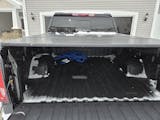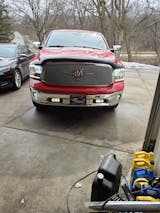Do towing mirrors affect MPG?
Have you wondered how towing mirrors, especially while extended, affect the fuel efficiency in your truck?
Many truck owners who want to upgrade their standard rearview mirrors to tow mirrors, will consider this question before purchasing it.
In this article, our product experts delved into this issue and conducted real-world tests to understand the impact of towing mirrors on miles per gallon (MPG).
Real-World Testing: Tow Mirrors vs. Stock Mirrors
Our product experts first conducted a comparison experiment between tow mirrors and standard mirrors. We compared the fuel economy results of installing both mirrors on the same pickup truck.
We can clearly see that the surface area of the trailer mirror is almost twice that of the standard mirror on the truck. According to aerodynamics, the more surface area you have, the more likely you are to create additional drag. In theory, our standard mirrors can glide through the air more effectively and reduce fuel consumption.

Our testers drove a 2002 Ford F-150 on Highway 85 with cruise control set to 72 mph. We used 93 octane as fuel.
Now, let's take a look at the fuel economy results. When using the standard mirror, we drove 18.7 miles per gallon. When using the towing mirror, we drove 17.9 miles per gallon. From the two test results alone, your MPG will decrease when you switch to a trailer mirror, even if the decrease is only 0.8 miles per gallon.
Next, let's analyze the fuel consumption savings. Assuming you drive 15,000 miles per year, half of which are on the highway, you only need to consume about 401 gallons of oil when driving with standard mirrors. If you use trailer mirrors, you will need to consume about 420 gallons of oil in a year.

The above is the test result of our experts. It is not only the trailer mirror that affects MPG, but also the exterior accessories such as the tonneau cover, so our experimental results are only for reference.
Should you have the mirrors up or down?
Recently, I saw that someone claimed to get six more miles per gallon on their truck after folding down their tow mirrors, which have two positions—up and folded down.
To find out, we ran two tests with a Ram truck—once with the mirrors folded and once with them extended—to see how much the trailer mirrors affect miles per gallon (MPG).
The pickup we tested gets about 23 MPG on the highway, and it's a two-door, four-wheel-drive truck. We used the same roads for both tests, maintaining a steady 65 to 75 mph. Here's how the experiment turned out.
Mirrors Down
The first test was with the towing mirrors folded down. Normally you would drive with the mirrors folded down when you are not towing a trailer. We drove 57 miles and then calculated the results.
After manually calculating the fuel consumption (dividing 57 miles by the 2.18 gallons of fuel we used), the fuel consumption was an amazing 26.1 MPG. This result surprised us.

Mirrors Up
For the second test, we flipped the mirrors up to see how the extended towing mirrors affect MPG. When fully extended, the mirrors extend 2-3 inches out of the truck, increasing air resistance.
We maintained the same speed, used cruise control, and the truck drove smoothly. After the same 57 miles, we stopped the vehicle. After calculating the actual fuel consumption, the MPG dropped significantly to 20.46MPG.
Should you have the tow mirrors up or down? According to our experimental results, when you fold the mirrors up and extend them, your MPG will drop compared to folding them up. If you want to save gas mileage, it is better to fold the tow mirrors when you drive a truck without a trailer. If you are towing a trailer, the unfolded mirrors play a vital role in both the visibility of the trailer behind and driving safety.
Common Myths About Tow Mirrors and MPG
After reading our two real-life tests on tow mirrors and MPG, you'll have a better understanding of towing mirrors. Here are some common misconceptions about them:
1. Tow mirrors significantly reduce MPG.
Many people believe that trailer mirrors cause a significant drop in fuel efficiency due to their size and additional wind resistance. However, the impact on MPG is minimal, especially with newer, more aerodynamic designs. Trailer mirrors create a slight drag, but only result in a slight drop in fuel economy, usually less than 1 MPG.
2. Tow mirrors are unnecessary if you're not towing.
Trailer mirrors are designed to provide better visibility when towing wide trailers, but they are still useful even when not towing. They provide a wider field of view, which improves safety, especially with large trucks or SUVs.
3. You can use regular mirrors for towing and still maintain MPG.
Standard mirrors don't provide as much visibility as trailer mirrors. While using regular mirrors may seem like a way to avoid a drop in MPG, it compromises safety, and using towing mirrors can minimize blind spots.

Where to buy towing mirrors?
After our series of experiments, have you eliminated your concerns about buying rearview mirrors? The impact of tow mirrors on pickup truck MPG is negligible, but it can help you reduce blind spots when towing and improve the safety of your towing vehicle. If you still don't know where to buy reliable trailer mirrors, here are the common purchase choices we found for you:
- Large online sales platforms such as Amazon, eBay, and Walmart, offer a variety of general and special towing mirrors. You can browse customer reviews to help you find the right product.
- Offline stores such as O'Reilly and Advance, which provide towing mirrors and installation guides in-store, are suitable for truck owners with sufficient budgets.
- Websites specializing in the sale of pickup truck parts, such as MOSTPLUS. We have been deeply involved in pickup truck parts for decades, aiming to bring high-quality products and services to customers. Choose our tow mirrors to escort your driving.
Featured Products
- $398.99
$419.99- $398.99
- Unit price
- / per
- $205.99
- $205.99
- Unit price
- / per
- $198.99
- $198.99
- Unit price
- / per
- $235.99
- $235.99
- Unit price
- / per
